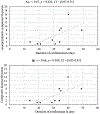The Effects of Confinement on Neuropsychiatric Symptoms in Alzheimer's Disease During the COVID-19 Crisis
- PMID: 32568211
- PMCID: PMC9988367
- DOI: 10.3233/JAD-200604
The Effects of Confinement on Neuropsychiatric Symptoms in Alzheimer's Disease During the COVID-19 Crisis
Abstract
Background: Neuropsychiatric symptoms, such as depression, anxiety, apathy, agitation, and hallucinations, are frequent in Alzheimer's disease (AD) and their prevalence tends to increase with external stressors.
Objective: We offer the first investigation of the effects of confinement during the COVID-19 crisis on neuropsychiatric symptoms in patients with AD.
Methods: We contacted caregivers of 38 patients with AD who were confined to their homes for nearly two months and asked them to report whether patients experienced any change in neuropsychiatric symptoms during, compared to before, the confinement and rate its severity and impact on themselves using the Neuropsychiatric Inventory-Questionnaire.
Results: Among the 38 patients, only 10 demonstrated neuropsychiatric changes during the confinement. Cognitive function of these 10 patients, assessed with the Mini-Mental State Examination, was worse than that of patients who did not demonstrate neuropsychiatric changes. Interestingly, among the 10 patients with neuropsychiatric changes, the duration of confinement significantly correlated with the severity of symptoms as well as with their caregivers' distress.
Discussion: The confinement seems to impact neuropsychiatric symptomatology in AD patients with low baseline cognitive function.
Keywords: Alzheimer’s disease; COVID-19; confinement; neuropsychiatric symptoms.
Figures
References
-
- McKhann G, Knopman DS, Chertkow H, Hyman BT, Jack CR Jr., Kawas CH, Klunk WE, Koroshetz WJ, Manly JJ, Mayeux R, Mohs RC, Morris JC, Rossor MN, Scheltens P, Carrillo MC, Thies B, Weintraub S, Phelps CH (2011) The diagnosis of dementia due to Alzheimer’s disease: Recommendations from the National Institute on Aging-Alzheimer’s Association workgroups on diagnostic guidelines for Alzheimer’s disease. Alzheimers Dement 7, 263–269. - PMC - PubMed
-
- Bomilcar I, Morris RG, Brown RG, Mograbi DC (2018) Implicit behavioral change in response to cognitive tasks in Alzheimer disease. Cogn Behav Neurol 31, 2–12. - PubMed
-
- Mograbi DC, Brown RG, Morris RG (2009) Anosognosia in Alzheimer’s disease – The petrified self. Conscious Cogn 18, 989–1003. - PubMed
Publication types
MeSH terms
Grants and funding
LinkOut - more resources
Full Text Sources
Medical


